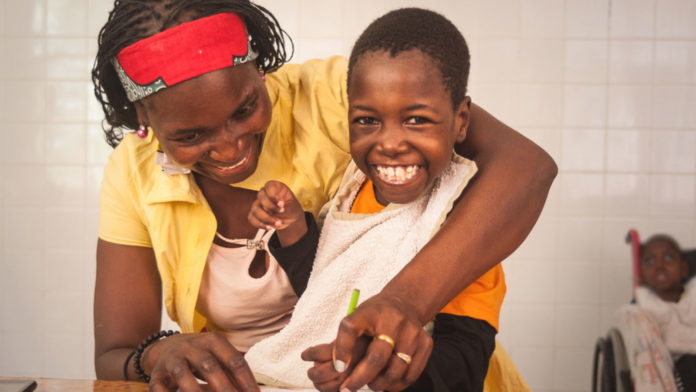GENEVA, MARCH 4 – 93 million children with disabilities cannot be left behind. “Italy fully share the view that their empowerment is crucial for the enjoyment of their human rights, including through inclusive education. The Italian legislation foresees that “the exercise of the right to education cannot be prevented by learning difficulties or difficulties deriving from disabilities”, the Italian Permanent Representative to the International Organizations in Geneva, Gian Lorenzo Cornado said today to the Annual Full Day Meeting of the Human Rights Council on the rights of the Child devoted this year to the empowerment of children with disabilities.
In keeping with the theme of the day, the U.N. has made the Council chamber wheelchair-accessible, has hired a sign interpreter for the hearing impaired, and has embossed some oral statements in Braille. According to the U.N., 93 million children with disabilities risk to be left behind. States should do more for them, as they are “the most likely to be left behind and the least likely to be heard”, UN High Commissioner for Human Rights, Michelle Bachelet, said today, opening the Annual Meeting.
 The Italian approach goes back almost 50 years, remarked Cornado. Back in the 70s, Italy decided to adopt an inclusive education model, in order to integrate and include students with disabilities in the education system: there are no differential classes and the principle of inclusion has been established for all students with disabilities in primary and secondary school from 6 to 14 years. A specific figure, the “special needs education teacher”, has been introduced. Other measures have been recently adopted to strengthen the inclusion framework for students with disabilities through individualised pathways, also with the contribution of social, health and education assistance services and concerned associations.
The Italian approach goes back almost 50 years, remarked Cornado. Back in the 70s, Italy decided to adopt an inclusive education model, in order to integrate and include students with disabilities in the education system: there are no differential classes and the principle of inclusion has been established for all students with disabilities in primary and secondary school from 6 to 14 years. A specific figure, the “special needs education teacher”, has been introduced. Other measures have been recently adopted to strengthen the inclusion framework for students with disabilities through individualised pathways, also with the contribution of social, health and education assistance services and concerned associations.
Italy – Cornado recalled – has also developed several school projects aimed at school inclusion, relating to: good practices on individual planning and job opportunities, due to adequate school orientation; Territorial Support Centres development; training for teachers about integration and support to students with disabilities within the school and in relation to educational relationships; and acquisition or empowerment of teachers methods to improve learning addressed to students with disabilities, in particular by means of the new technologies.
A practicing pediatrician before entering politics, Bachelet noted how quickly she learned that the voices of disabled children too often go unheard. “While preparing for today, I was remembering when I just started to be a pediatrician. People denied, people hide those children. They will put them sort of in boxes so they will not really be able to develop. They will speak — even doctors in front of the children — like either they did not hear or that they did not exist.” On the contrary, “children with disabilities must have a say in all matters that affect the course of their lives…They must be empowered to reach their full potential and enjoy their full human rights – and this requires us to change both attitudes and environmental factors,” Ms. Bachelet insisted. “We can no longer have children being hidden away and isolated, children with disabilities must have the opportunity to dream of a full and happy life,” agreed Ms. Catalina Devandas Aguilar, Special Rapporteur on the rights of persons with disabilities. (@OnuItalia)

